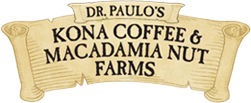Kona Today
In 1999, Paul Sterling began farming coffee in the Captain Cook-Honaunau area of the big island of Hawai’i. However, Paul has been involved in the development of nutrient and agronomic programs for coffee, macadamia nuts, sugar cane, and pineapple since 1970.
Paul’s vision and desire to take care of the land while providing a way to involve his family and create an ‘ohana of farms is how the concept evolved into what it is today.
Much of the Kona farming region is held within the estate of the late Princess Ke Ali’i Bernice Pauahi Paki Bishop (1831-1884). Princess Bishop, great-granddaughter and last royal descendant of King Kamehameha, had witnessed the growing influence and domination of foreigners. She saw the decline of her people, decreasing steadily from 400,000 native population to fewer than 45,000 people in 1878. She believed that education was the only force which could reverse the hopelessness of her people. In her will, the Princess instructed that her real estate and fortune be used to create and maintain what is now known as The Kamehameha Schools. A large percentage of coffee farming in Kona has been done by leaseholders for generations, while others are held as fee simple properties.
In the late 1970’s and 1980’s, the dramatic growth of the specialty coffee market revitalized the Kona coffee industry. Kona coffee established a firm foothold as being among the finest gourmet coffees in the world.
The Kona coffee region of Hawai’i is the world of the small coffee farm. Hawai’i remains the sole U.S. producer of commercially grown coffee, and Kona coffee is truly rare. There are over 650 coffee farms in Kona with an average farm size of about 3 acres. The annual Kona coffee production exceeds 2 million pounds of green coffee which represents just a tiny fraction of the total world coffee production.

Pu’uhonua o Honaunau National Historical Park
Developing coffee farms in Kona has been quite rewarding for Paul. Over the years, many of these farms were abandoned or fell into disrepair. Paul decided to gather some of these farms into an ‘ohana, or family-run plantations, preserving the individual identity of each farm while carefully protecting the great traditions that are the reasons for the wonderful taste of Kona coffee.
The coffee produced on the various farms of Dr. Paulo’s Kona Coffee Company, along with the macadamia nuts, are the best this enchanted land has to offer. The increasing success of Dr. Paulo’s Kona Coffee Company allows for the continued growth in the macadamia nut business, and there is planned development for future growth on our farms.
